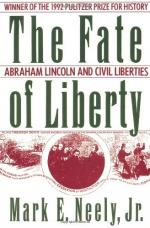
|
| Name: _________________________ | Period: ___________________ |
This test consists of 15 multiple choice questions and 5 short answer questions.
Multiple Choice Questions
1. According to "The American Cyclopaedia and Register of Important Events of the Year 1865," how many citizens are denied habeas corpus?
(a) 13,535.
(b) 942.
(c) 20,000.
(d) 38,000.
2. Which iron side steamship rams the USS Niphon?
(a) The Ella and Annie.
(b) The USS Constitution.
(c) The CSS Merrimac.
(d) The Steamship Calhoun.
3. Who is Wes Bogan?
(a) A wealthy businessman arrested for blockade running.
(b) A black man tried for the murder of his ex-master.
(c) A slave who sues for his freedom.
(d) A grocer arrested for bringing illegal goods across picket lines.
4. Which politician quotes Lord Coke by saying, "Where courts of law are open, martial law cannot be executed"?
(a) George B. McClellan.
(b) Abraham Lincoln.
(c) Clement Vallandingham.
(d) Horatio Seymour.
5. Why does Lincoln feel the need to censure John Fremont?
(a) Lincoln believes Fremont is part of an assassination plot.
(b) Fremont's actions are political and outside his realm of power.
(c) Fremont is a Confederate spy.
(d) Fremont is a Confederate supporter.
6. To which military and political leader does James Bryce liken President Lincoln?
(a) Thomas Jefferson.
(b) Oliver Cromwell.
(c) Andrew Jackson.
(d) Napoleon Bonaparte.
7. Who is Joseph Holt?
(a) Judge Advocate General in 1862.
(b) Secretary of War from 1863-65.
(c) District Attorney of D.C. from 1863-65.
(d) Secretary of State from 1881-1884.
8. Who is the presidential nominee for the Democratic party in 1864?
(a) Abraham Lincoln.
(b) George B. McClellan.
(c) Sidney Cromwell.
(d) John V. L. Pruyn.
9. Which 20th century historian depicts Lincoln as a merciful humanitarian caught in between preserving the Union and violating civil rights?
(a) Frank Klement.
(b) Dean Sprague.
(c) James G. Randall.
(d) James McPherson.
10. As a congressman in 1848, why doesn't Lincoln want to wait for a constitutional amendment?
(a) He prefers the use of presidential "express authority."
(b) He believes Confederate spies are working within Congress.
(c) He fears Congress will not act in the best interests of the country.
(d) He believes the amendment will be too weak.
11. What war makes Lincoln aware of the importance of constitutional issues?
(a) The French-Indian War.
(b) The Civil War.
(c) The Mexican-American War.
(d) The Revolutionary War.
12. With what crime is Skipper F. N. Bonneau charged?
(a) Treason.
(b) Battery.
(c) Theft.
(d) Piracy.
13. Which General orders all blockade runners released in 1864?
(a) William T. Sherman.
(b) Edward Bates.
(c) Ulysses S. Grant.
(d) John A. Dix.
14. In Chapter 8, which person in America has the final say on all verdicts during the Civil War, particularly death sentences?
(a) William H. Seward.
(b) Edward Bates.
(c) Edwin M. Stanton.
(d) President Lincoln.
15. Which pioneer political scientist drafts War Department General Order No. 100, specifying that hostages be treated as POWs?
(a) Henry W. Halleck.
(b) Joel H. Silbey.
(c) James McPherson.
(d) Francis Lieber.
Short Answer Questions
1. What is an "arbitrary arrest"?
2. Which ship captures the Banshee in 1863?
3. According to Lincoln, what act did President Jefferson commit without having the constitutional power to do so?
4. Who is John Quincy Adams's political nemesis?
5. Which Union general has President Lincoln's blessing to arrest all the men he wishes and freeing those who are willing to take an oath of allegiance?
|
This section contains 535 words (approx. 2 pages at 300 words per page) |

|




